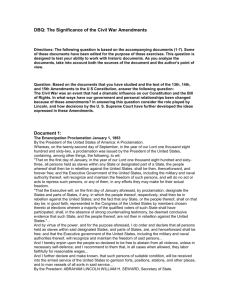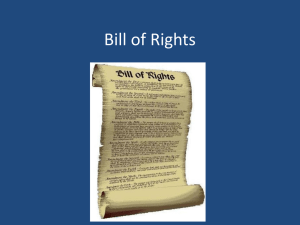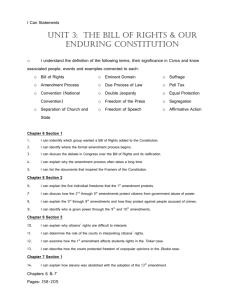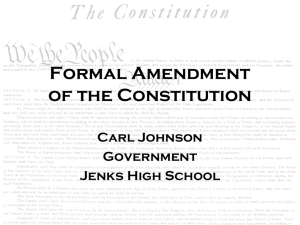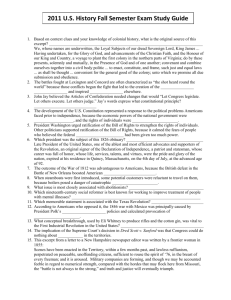DBQ: The Significance of the Civil War Amendments Bill Woolwine
advertisement
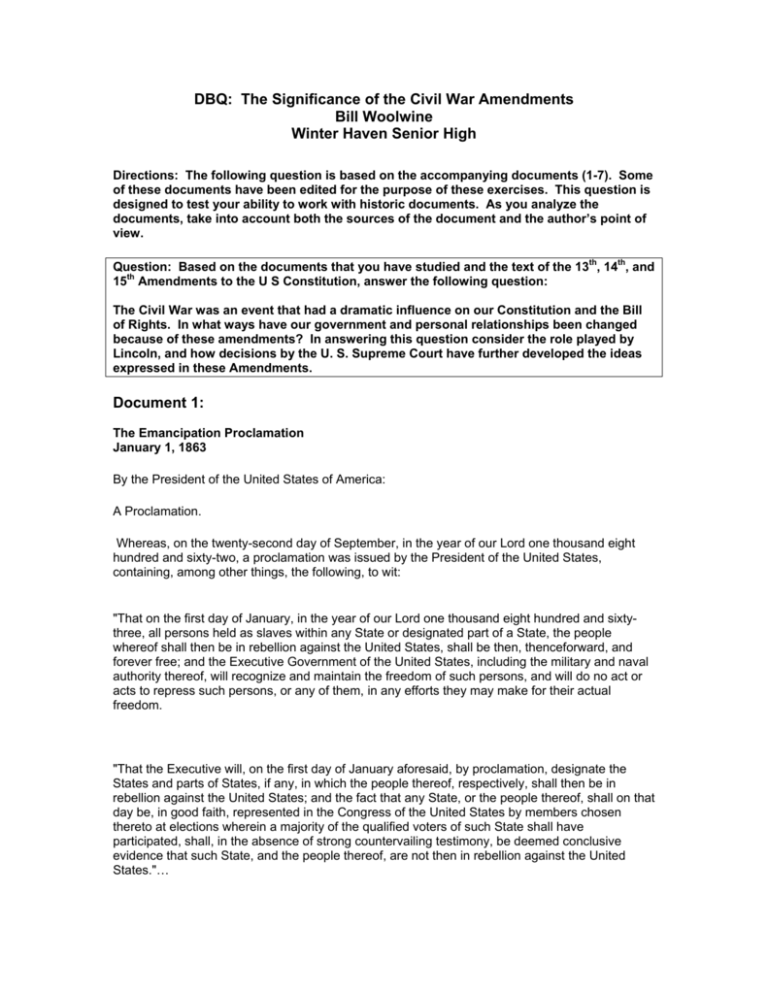
DBQ: The Significance of the Civil War Amendments Bill Woolwine Winter Haven Senior High Directions: The following question is based on the accompanying documents (1-7). Some of these documents have been edited for the purpose of these exercises. This question is designed to test your ability to work with historic documents. As you analyze the documents, take into account both the sources of the document and the author’s point of view. Question: Based on the documents that you have studied and the text of the 13th, 14th, and 15th Amendments to the U S Constitution, answer the following question: The Civil War was an event that had a dramatic influence on our Constitution and the Bill of Rights. In what ways have our government and personal relationships been changed because of these amendments? In answering this question consider the role played by Lincoln, and how decisions by the U. S. Supreme Court have further developed the ideas expressed in these Amendments. Document 1: The Emancipation Proclamation January 1, 1863 By the President of the United States of America: A Proclamation. Whereas, on the twenty-second day of September, in the year of our Lord one thousand eight hundred and sixty-two, a proclamation was issued by the President of the United States, containing, among other things, the following, to wit: "That on the first day of January, in the year of our Lord one thousand eight hundred and sixtythree, all persons held as slaves within any State or designated part of a State, the people whereof shall then be in rebellion against the United States, shall be then, thenceforward, and forever free; and the Executive Government of the United States, including the military and naval authority thereof, will recognize and maintain the freedom of such persons, and will do no act or acts to repress such persons, or any of them, in any efforts they may make for their actual freedom. "That the Executive will, on the first day of January aforesaid, by proclamation, designate the States and parts of States, if any, in which the people thereof, respectively, shall then be in rebellion against the United States; and the fact that any State, or the people thereof, shall on that day be, in good faith, represented in the Congress of the United States by members chosen thereto at elections wherein a majority of the qualified voters of such State shall have participated, shall, in the absence of strong countervailing testimony, be deemed conclusive evidence that such State, and the people thereof, are not then in rebellion against the United States."… And by virtue of the power, and for the purpose aforesaid, I do order and declare that all persons held as slaves within said designated States, and parts of States, are, and henceforward shall be free; and that the Executive government of the United States, including the military and naval authorities thereof, will recognize and maintain the freedom of said persons… And I hereby enjoin upon the people so declared to be free to abstain from all violence, unless in necessary self-defence; and I recommend to them that, in all cases when allowed, they labor faithfully for reasonable wages… And I further declare and make known, that such persons of suitable condition, will be received into the armed service of the United States to garrison forts, positions, stations, and other places, and to man vessels of all sorts in said service… By the President: ABRAHAM LINCOLN WILLIAM H. SEWARD, Secretary of State. 1. Following what event did Lincoln make this Proclamation? 2. Were all slaves freed by this Proclamation? 3. Did this Proclamation have the power of law? Document: 2 13th. Amendment to the U.S. Constitution Section 1. Neither slavery nor involuntary servitude, except as a punishment for crime whereof the party shall have been duly convicted, shall exist within the United States, or any place subject to their jurisdiction. Section 2. Congress shall have power to enforce this article by appropriate legislation. Proposed: January 31,1865 Ratified: December 6, 1865 4. Why was it necessary to add this amendment to the Constitution? 5. What is the relationship between the Emancipation Proclamation and the 13th Amendment? Document 3: 14th. Amendment to the U.S. Constitution Section 1. All persons born or naturalized in the United States, and subject to the jurisdiction thereof, are citizens of the United States and of the State wherein they reside. No State shall make or enforce any law which shall abridge the privileges or immunities of citizens of the United States; nor shall any State deprive any person of life, liberty, or property, without due process of law; nor deny to any person within its jurisdiction the equal protection of the laws. Section 2. Representatives shall be apportioned among the several States according to their respective numbers, counting the whole number of persons in each State, excluding Indians not taxed. But when the right to vote at any election for the choice of electors for President and Vice President of the United States, Representatives in Congress, the Executive and Judicial officers of a State, or the members of the Legislature thereof, is denied to any of the male inhabitants of such State, being twenty-one years of age,(See Note 15) and citizens of the United States, or in any way abridged, except for participation in rebellion, or other crime, the basis of representation therein shall be reduced in the proportion which the number of such male citizens shall bear to the whole number of male citizens twenty-one years of age in such State. Section 3. No person shall be a Senator or Representative in Congress, or elector of President and Vice President, or hold any office, civil or military, under the United States, or under any State, who, having previously taken an oath, as a member of Congress, or as an officer of the United States, or as a member of any State legislature, or as an executive or judicial officer of any State, to support the Constitution of the United States, shall have engaged in insurrection or rebellion against the same, or given aid or comfort to the enemies thereof. But Congress may by a vote of two-thirds of each House, remove such disability. Section 4. The validity of the public debt of the United States, authorized by law, including debts incurred for payment of pensions and bounties for services in suppressing insurrection or rebellion, shall not be questioned. But neither the United States nor any State shall assume or pay any debt or obligation incurred in aid of insurrection or rebellion against the United States, or any claim for the loss or emancipation of any slave; but all such debts, obligations and claims shall be held illegal and void. Section 5. The Congress shall have power to enforce, by appropriate legislation, the provisions of this article. 6. What is the relationship between the Bill of Rights and the 14th amendment? 7. Why was it necessary to define citizenship in the 14th amendment? 8. Is the definition of citizenship being challenged today because of the concern over illegal aliens? Document 4: Proposed: June 13, 1866 Ratified: July 9, 1868 15th. Amendment to the U.S. Constitution Section 1. The right of citizens of the United States to vote shall not be denied or abridged by the United States or by any State on account of race, color, or previous condition of servitude. Section 2. The Congress shall have power to enforce this article by appropriate legislation. Proposed: February 26, 1869 Ratified: February 3, 1870 9. What other amendments have expanded suffrage in the United States? 10. Why was this amendment necessary following the addition of the 14th amendment? Document 5: Timeline 1854 o The Kansas-Nebraska Act causes fighting in Kansas and Nebraska over whether those new states should allow slavery or not. 1857 o Dred Scott takes his case to win his freedom to the Supreme Court, and the court rules that slaves who escape to free states must be returned to their masters. 1859 o John Brown attacks the military arsenal at Harper’s Ferry to start a slave revolt and end slavery. 1860 o Abraham Lincoln is elected the sixteenth President of the United States, and begins to work to keep the country together. 1860-1861 o Southern states break away from the United States, angering northerners and causing the Civil War. 1861-1865 o The North (Union) battles the South (Confederacy) in the Civil War. 1863 o The Emancipation Proclamation frees slaves in southern states to punish the south for trying to break away from the country. 1865 o The Thirteenth Amendment ends slavery in the United States. o President Abraham Lincoln is assassinated. 1865-1877 o During Reconstruction, the Union Army keeps southerners from treating their freed slaves badly. 1868 o The Fourteenth Amendment makes all people born in the United States citizens. o The Ku Klux Klan begins terrorizing blacks. 1870 o The Fifteenth Amendment gives black men the right to vote 1896 o In the case of Plessy v. Ferguson, the Supreme Court rules that it is constitutional to require black and white people to be treated "separate but equally." 11. How does the timeline show conflict during time period shown? 12. How do the decisions of the Supreme Court show that further changes were needed? Document 6: Lincoln Memorial 13. What was the role of Lincoln in bringing about change during this period? 14. Was he instrumental in the passage of the 13th, 14th, and 15th amendments? 15. How would you compare his influence on the development of civil rights and our constitution to the influence George Washington and Thomas Jefferson? Document 7: Picture 16. This picture best illustrates which of the three Civil War amendments and why? 17. Were the slaves economically, socially, and politically free because of these amendments? Document 8: The U. S. Supreme Court 18. Which amendment has been most often addressed by the court and which sections of the amendment have been questioned? 19. Why does the Court have a greater impact on defining our Constitution than the other branches? 20. Does the term of office give them an advantage over the other branches?

